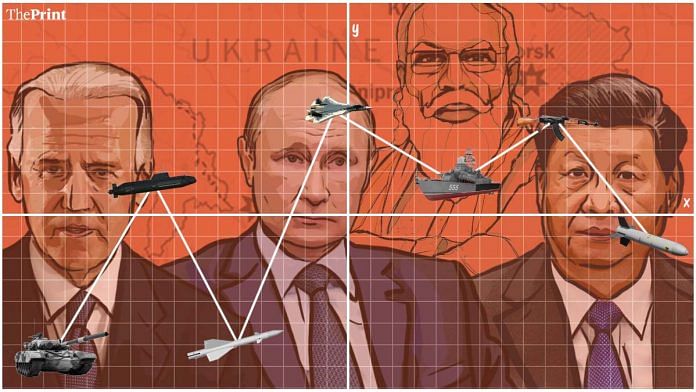Twenty-five years ago, the International Monetary Fund forced the wrong medicine down the throats of East Asian economies facing a foreign exchange shortage. Countries like Indonesia convulsed into near-collapse. Bitter lesson learnt, regional players said “never again” and have since accumulated mountains of foreign exchange reserves. Three decades earlier, US President Lyndon Johnson weaponised wheat supplies to a famine-stricken India because, despite being a supplicant, New Delhi had the temerity to criticise US actions in Vietnam. “Never again,” said Indira Gandhi as India pushed ahead with the Green Revolution and began the pile-up of grain that is now as much in excess as the Reserve Bank’s dollar hoard.
Countries confronted with blackmail tend to overlook the peace-time benefits of inter-connectedness and seek safety in self-reliance. That is why the West’s attempt to bring Vladimir Putin to heel by weaponising everything from aircraft spares to finance will have much wider repercussions. What the West has just done is shoot a bunch of missiles at the architecture of globalisation. Any country of size will be figuring out what this could mean, and how to build bulwarks.
The nightmare scenario for India is a cornered Russia that accepts a Chinese embrace even as Beijing and Islamabad form a military axis. Ukraine is just now learning what happens when you poke a more powerful neighbour in the eye, even if your citizens have less and less love for that neighbour. It may get military aid, but it fights alone. The parallels for India are obvious — and Beijing is less susceptible to sanctions.
Then again, Russia has lost traction. The Soviet Union used to be India’s largest trading partner, but India now buys little other than defence hardware and oil. Russia still supplies what no one else will, so the defence relationship remains indispensable. But its Ukraine misadventure will leave it weakened and its defence industry possibly unable to maintain its cutting edge. Its sanctions-hit economy could also become an unreliable supplier. Even its veto in the UN Security Council may not be easily available, particularly if required against China. The assurance of a security blanket may belong to the past.
Also read: Fuel price shock coming, growth to suffer. Govt should roll back tax hikes for consumers’ sake
One option is to play ball with the West and follow its rules, however selectively they are applied to non-Western societies. But India will never be an “honorary White”. With its long memory of racism and colonialism, its size and cultural autonomy, it is unlikely to uncritically accept rules set elsewhere and differentially applied — pace its nuclear programme that defied global sanctions. Yet, maintaining a non-committal diplomatic stance may become trickier.
That leaves the trigger response of self-reliance. This is a very partial solution as inward-looking economies don’t do well. Besides, there is no alternative to the dollar, supply chains are not about to disappear, the country will remain import-dependent for energy, and the West dominates all major international institutions. Breaking free is impossible unless one wants to be a North Korea. The push to indigenise every major weapons system may sound great, but could be overreach. If imports are stopped and domestic production does not happen, we could end up with neither. Besides, almost every indigenous weapons system has a significant import content — the Tejas’s engine is made by General Electric, the navy’s ships have engines from Ukraine, and so on.
This is not to minimise the importance of initiatives like the “India Stack” of indigenous technologies on which to build digital applications: The runaway success that is the Unified Payments Interface, the nascent domestic alternative to the US-based GPS (global positioning system) for everything from mobile phones to ships at sea, and so on. Even forced data localisation could be defended if the institutions of the republic stay strong. In manufacturing, the new context buttresses the otherwise weak logic of the productivity-linked incentive scheme for indigenising key industries — if narrowly focused on what is really key, and properly re-oriented. The point is to build bulwarks, while staying aware of the limits of such a strategy. Russia, responding to sanctions since 2014, tried to build a “fortress economy” but remained vulnerable. The alternative of selective integration may work better by creating mutual interdependence.
By special arrangement with Business Standard
Also read: Let’s focus on getting women into education, work. Don’t make it conditional on what they wear



